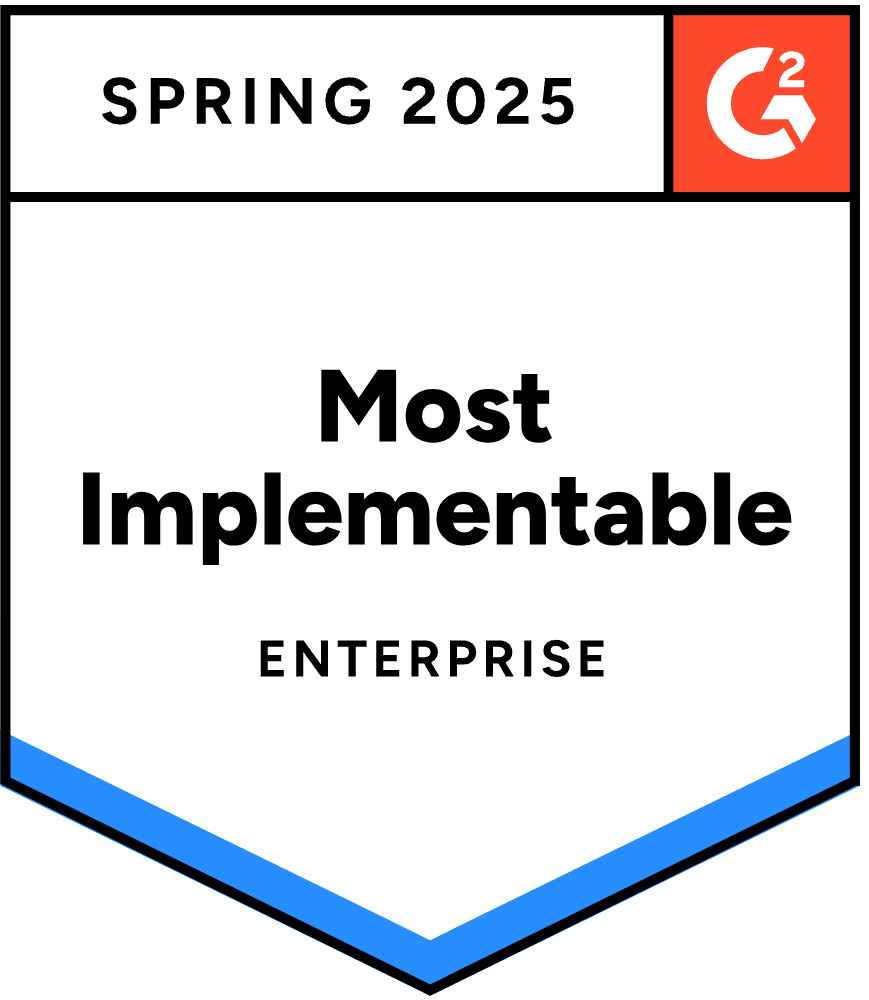What is Soft Skills Training + The Best Ways to Train Your Team
Elise Dopson | WorkRamp Contributor
View bioLearning Tips Straight to Your Inbox
A workforce that can adapt quickly to different environments is a priority for most businesses. Resilience is a skill that can carry your organization through tough times and create a more positive working environment.
The bad news? An overwhelming 87 percent of businesses are aware that they either already have a shortage of employee skills—or expect one to occur within the next few years.
Research shows that 85 percent of career success comes from having well-rounded soft skills. In fact, the global soft skills training market is expected to double and reach over $47 billion by 2027, largely because employees with both are easier to work with.
Unsure of the difference between each type of skill? Learn more and discover soft skills training ideas designed to upskill your workforce and offer a positive employee experience.
In this post:
What are soft skills?
Soft skills revolve around personalities, habits, and traits—mainly focusing on how people interact. Employers that value soft skills search for new hires with excellent interpersonal and communicative skills rather than focusing solely on qualifications and previous experience.
Soft skills vs. hard skills
Which of these is more important? Well, that’s a difficult question to answer. But, given that every job needs a combination of both, team members need a certain level of proficiency in hard and soft skills.
Soft skills include traits such as:
- Communication: Verbal, written, and non-verbal
- Emotional intelligence: Self-awareness and self-regulation with colleagues and clients
- Problem-solving: Identifying, testing, and analyzing better solutions
- Critical thinking: Predicting and evaluating new ideas
- Organization: Time management, multi-tasking, and planning workloads
- Leadership: Consistency, fairness, and integrity
- Adaptability: Resilient, willing to change, and see this as an opportunity
Read more: Workplace Resilience: 7 Ways to Support Your Team to Bounce Back
Some professions will have a higher demand for technical skills and will prioritize hard skills over the traits we mentioned above.
Hard skills are measurable, often quantifiable, and gained through formal education, certifications, and life or job experience.
Hard skills are:
- Tangible, such as qualifications and certifications
- Technical, such as operating heavy equipment or developing a website
- Rule-based, such as automation software or machine learning
- Budgetary, such as financial management or project management
- Licensed, such as construction or healthcare credentials
What is soft skills training?
Soft skills training revolves around personality traits like communication, emotional intelligence, and critical thinking (as opposed to hard skills relating to certifications or job experience).
By 2030, soft skills jobs are predicted to make up 63 percent of all jobs. Driving this prediction is a world driven by automation. Soft skills training gives employees the tools and resources to engage with the people around them.
Without good communication or listening skills, for example, employees can miss deadlines or miss out on important information.
Read more: 6 Skill Development Tactics for Successful Teams
Top benefits of soft skills training in the workplace
Employees with soft skills can imagine unique ideas that can be translated into the workplace. By implementing these ideas, companies are innovative and rise to challenges, such as reacting with reduced budgets or issues with staffing.
Take customer service teams, for example. One-third of customers would consider switching companies immediately after receiving poor customer service. But employees with a range of soft skills provide businesses with increased customer satisfaction and, therefore, retention rates. That results in more revenue for the company.
Secondly, soft skills help to prevent employee turnover. Employees don’t just want perks such as gym memberships or free food. They want development opportunities to progress in their roles and careers.
What’s more, leaders need soft skills to manage employees effectively. Listening without interrupting, for example, is essential during one-on-one meetings or leading a team meeting.
Lastly, employee soft skills reduce staff turnover. The ability to delegate tasks fairly will lessen employees feeling the brunt of unfair workloads. In fact, a manager’s soft skills can identify which employees are best equipped to perform specific tasks—building confidence in individual members of your team.
8 soft skills training ideas for your employees
Soft skills cannot be replaced by technology or artificial intelligence. Here are eight future-proof soft skills to train your employees on.
Communication
Most (80 percent) of employees say poor communication increases workplace stress.
Communication soft skills help employees figure out problems, manage differences, and be good listeners.
Communication is a complex skill that’s reliant on other cognitive skills such as speaking, reading, and critical thinking.
Teamwork
Nothing destroys a team more than a toxic employee. Encourage team members to value differences and support each other with soft skills training that promotes positivity and honesty and inclusivity.
Develop soft skills and create a workplace where it’s OK to respectfully disagree, apologize, and admit mistakes without fear of reprisal.
Time management
Over half of all employees say they don’t have things under control at work every day. Busy schedules, managing deadlines, and conflicting priorities all require time management soft skills.
Time management soft skills will give employees the tools to plan their day, organize their workload, and delegate tasks.
Leadership
Poor leadership skills can make employees quit. Studies show bad leadership behavior seriously impacts productivity.
Improve leadership skills across your organization by building self-awareness with good reflective skills. Help employees learn how to use feedback and become more aware of their strengths.
Negotiation
Negotiation soft skills impact everyday life—both professionally and personally. Asking the right questions and building rapport gives employees the skills they need to build relationships with peers and customers.
Similarly, persuasion is a soft skill that aims to convince others to view things differently and change their minds.
Finally, good negotiation soft skills encourage employees to have two-way conversations—actively listening and responding to queries.
Presentation skills
Great presentation soft skills support employee growth, which is particularly important for those in the sales, marketing, and education sectors.
Presentations are routine for many businesses. Support employees to communicate effectively to their target audience by improving the clarity of their message. Make sure potential clients understand your product and build confidence in your brand.
Emotional intelligence
The effects of employees with low emotional intelligence can be problematic. For example, saying the wrong things at the wrong time can lead to workplace tension or losing clients.
Employees who aren’t emotionally intelligent often judge others and have difficulty accepting feedback.
Incorporate emotional intelligence into your soft skills training program. Team members with strong emotional intelligence can sense, evaluate, express, and control their emotions well.
Critical thinking
Critical thinking soft skills training helps team members solve problems, analyze, and argue points of view.
Employees who think clearly and rationally can understand the logical connection between ideas, helping your organization innovate and stay ahead of the competition.
Best ways to train employees on soft skills
The best way to upskill employees’ soft skills depends on the topic, their preferred learning style, and of course, your budget.
Here are some soft skills training methods to consider.
Coaching or mentoring
The business coaching market has grown steadily over the last few years, largely because businesses recognize the benefit of mentoring opportunities on the soft skills of employees.
Coaching helps employees set goals and work out problems, guiding them to find their own solutions. Employees are better equipped to assess their strengths, as well as their areas of development.
Interactive workshops
Interactive workshops can be tailored to suit individual employees—including remote colleagues. Complement your customer training programs with interactive classroom sessions from WorkRamp.
Interactive workshops allow employees to ask questions, get feedback, and chat with their colleagues. Workshops provide a safe space for team members to build interpersonal soft skills that can help them complete their job.
Peer (social) learning
Social learning involves peer-to-peer education. It’s a type of informal learning that generates conversations, increasing employee knowledge, skills, and confidence.
Use everyday soft skill examples that are unplanned and spontaneous. If a colleague used patience and emotional intelligence to resolve an unhappy customer’s support ticket, for example, invite them to share their process with the rest of the team.
Online learning
Online learning platforms allow businesses to scale since you can train multiple learners simultaneously. It’s great for remote team training, too. Not only will you reduce the cost associated with hiring a physical classroom, but the option to learn asynchronously makes your soft skills training program more accessible.
Need help getting started with your online training program? The WorkRamp Marketplace has prebuilt soft skills training programs you can quickly customize and share with your team.
Augmented and virtual reality
Some organizations avoid using new technologies in fear it’ll replace their human team. However, a PwC study shows augmented reality (AR) and virtual reality (VR) are effective ways to upskill your teams’ soft skills:
- VR learners were 4x more focused during training
- VR learners felt 3.75x more emotionally connected to the content
- 40% of VR learners saw an improvement in confidence
The easiest way to incorporate AR or VR into your soft skills training program is to role-model common scenarios that happen in the workplace. For example, if you’re training retail staff, use a VR program that allows them to interact with virtual shoppers in real time.
An all-in-one learning platform for soft skills training
Create, customize, and launch new learning programs tailored to individual needs with WorkRamp.
Use gamification strategies to increase enjoyment and engagement. Take it from Lish Barber, Director of GTM Enablement, Lattice, who used WorkRamp while leading Global Revenue Enablement at Algolia. The brand wanted to improve its employee onboarding training and create a complete learning experience. Algolia used WorkRamp’s LMS to create pop-up quizzes and matching games to motivate employees.
“WorkRamp gives us visibility into how each role in our organization impacts customer experience,” Lish said. “Being able to truly own that narrative is so powerful. We know that we have a real impact, internally, and externally.” Algolia.”
Pre-recorded videos are another great way to improve employee soft skills using WorkRamp. They’re easily accessible, helping employees who are visual learners to succeed. Include YouTube videos in training programs and encourage employees to chat with each other about what they have learned—improving soft skills in teamwork and communication.
Build your employees’ soft skills with WorkRamp
It’s easy to teach someone how to use new software or accounting. But traits like honesty, integrity, and trust are essential qualities that are harder to teach.
Employee soft skills are in demand by businesses. Secure top talent by creating opportunities for employees to improve their soft skills. From leadership to emotional intelligence, soft skills training pays dividends in the long term.
Help your team develop stronger soft skills with WorkRamp. Contact us to schedule a free, personalized demo.
Complete the form for a custom demo.
Recent Posts
- Why Secure LMS Platforms Are a Must for Regulated Industries July 10, 2025
- Top LMS Integrations That Power Smarter, Faster Learning July 2, 2025
- Introducing WorkRamp Analytics Studio: Unlocking Your Data Insights with AI June 30, 2025
- 11 AI LMS for AI-Powered Learning June 27, 2025
- The Best LMS Platforms for Customer Retention (2025 Guide) June 27, 2025
Elise Dopson
WorkRamp ContributorElise Dopson is a freelance writer for B2B SaaS companies. She’s also the co-founder of Peak Freelance and mom to an adorable Spaniel pup.
You might also like
Discover how increasing your L&D budget benefits your team and your organization
Your team is your greatest asset, and investing in their learning and development benefits your business.
Read More
How to make learning a competitive advantage
Industry experts share actionable strategist to shape your L&D program and boost employee engagement.
Read More
Simple steps to promote continuous learning and improvement
Check out these three actionable ways to expand and improve your L&D program.
Read More
Decrease Ramp Time and Increase Revenue
Get in touch to learn how WorkRamp can help you achieve your learning and development goals.
Request a Demo




